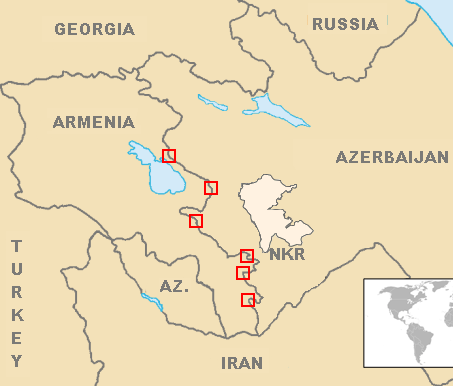On Monday, September 12, 2022, Azerbaijani troops began intensively bombing Armenian military targets on the internationally recognized territory of Armenia. Two days later, in retaliation for Monday’s attack, the Armenian army began shelling Azerbaijani positions. On the same day, however, both sides signed a cease-fire and the violence temporarily subsided. The worst violence since the end of the Nagorno-Karabakh war of 2020 has resulted in nearly 200 dead on both sides.
Artillery skirmishes are only the latest part of the Armenian-Azerbaijani conflict, at the center of which lies the dispute over Nagorno-Karabakh. Although Nagorno-Karabakh was ethnically almost completely Armenian, it was assigned to the Azerbaijan SSR by Moscow during the early years of the USSR. During the period of Stalinism, the conflict was temporarily frozen, due to the massive repression of both sides by Moscow. But the tension between the two ethnicities grew rapidly during perestroika when new political freedoms allowed both parties to campaign for their interests. In 1988, ethnic cleansing and mass migration began in both republics. When the Soviet army withdrew from the Southern Caucasus after the collapse of the USSR in 1991, the Armenians in Nagorno-Karabakh declared independence. Subsequently, a war broke out between the already completely independent Armenia and Azerbaijan, as a result of which the formally independent Armenian Republic of Nagorno-Karabakh was created, an internationally unrecognized de facto state on the territory officially belonging to Azerbaijan. All parties to the conflict signed a cease-fire in 1994.
This was followed by a long period when the dispute over Nagorno-Karabakh was a frozen conflict, with sporadic and relatively small skirmishes in the border regions. During this period, Armenia became closer to Russia and Azerbaijan to Turkey. At the same time, Azerbaijan began to receive huge revenues from the export of oil and natural gas and spent these resources to a large extent on the purchase of high-quality armaments from Turkey and Israel.
In 2020, Azerbaijan launched an offensive against Armenian forces in Nagorno-Karabakh and, using advanced drones and artillery, was able to defeat the Armenian army. Only Vladimir Putin stopped the collapse of the Armenian front line when he brokered a cease-fire between the states. Azerbaijan has regained much of Nagorno-Karabakh, a prisoner exchange has been agreed, Russian peacekeeping forces have been deployed to the area, and both countries have pledged to open economic and transport corridors and connections. Russian peacekeeping troops occupied the key Lachin Corridor, which connects Nagorno-Karabakh with Armenia. Despite the signed truce, the peace treaty between Armenia and Azerbaijan has not yet been signed, nor have all obligations resulting from the truce been fulfilled.
The motives that led Baku to the recent aggression are very likely based mainly on dissatisfaction with the fact that the talks with Armenia about the signing of a final peace treaty regarding Karabakh and the common border are progressing very slowly, and that Yerevan is also effectively blocking the creation of the so-called Zangezur transport corridor, which would connect the Azerbaijani enclave of Nakhichevan with Azerbaijan itself. The corridor has the great geopolitical potential not only for Azerbaijan but also for Turkey. It promises a more efficient economic connection with Central Asia. Last but not least, Azerbaijan feels that Armenia and its main ally Russia are significantly weakened. The Azerbaijani attack came just six days after the Ukrainian military launched a major offensive in the Kharkiv region. Thus, Baku may sense an opportunity to put pressure on Armenia to give up the rest of Nagorno-Karabakh as well.
The situation has the potential to escalate even more. The Russian Federation played a key role as a peacekeeper in the region. If the situation in Ukraine continues to deteriorate for Russia and it is forced to send as much military force to Ukraine as possible, this will free up Azerbaijan’s hands to conduct a more ambitious foreign policy. It is possible that if Russia’s influence weakens enough, Azerbaijan will try to occupy all of Nagorno-Karabakh. The European Union is currently not in a position where it would allow itself to force peace negotiations between Azerbaijan and Armenia, because it is trying to replace Russian gas with the gas from Azerbaijan. War in the Caucasus could cut off the EU from gas from the Caucasus, as well as from Central Asia, and would significantly damage Europe’s energy security. Armenia’s only hope is Iran. Iran has had strained relations with Azerbaijan due to the large Azerbaijani minority living on Iranian territory, and especially because of the cooperation between Israel and Baku. That is why Tehran began to cooperate closely with Armenia and perceives Turkey, which supports Azerbaijan, as its regional rival. In the future, we could see the Armenian-Azerbaijani conflict transformed into a proxy conflict between Iran and Turkey for control of the Caucasus. The Caucasus could thus become another battlefield of the tripolar cold war in the Middle East between Saudi Arabia and Israel-Iran-Turkey. Currently, however, it seems that Iran’s ability to at least partially replace Russian influence in the Caucasus is considerably limited, and apart from rhetoric, Tehran is not yet able or willing to take real steps in the region. The decline of Russian influence not only in the Caucasus is very likely to continue fueling Baku’s willingness to achieve its demands by force.
Photo credit: Viewsridge


